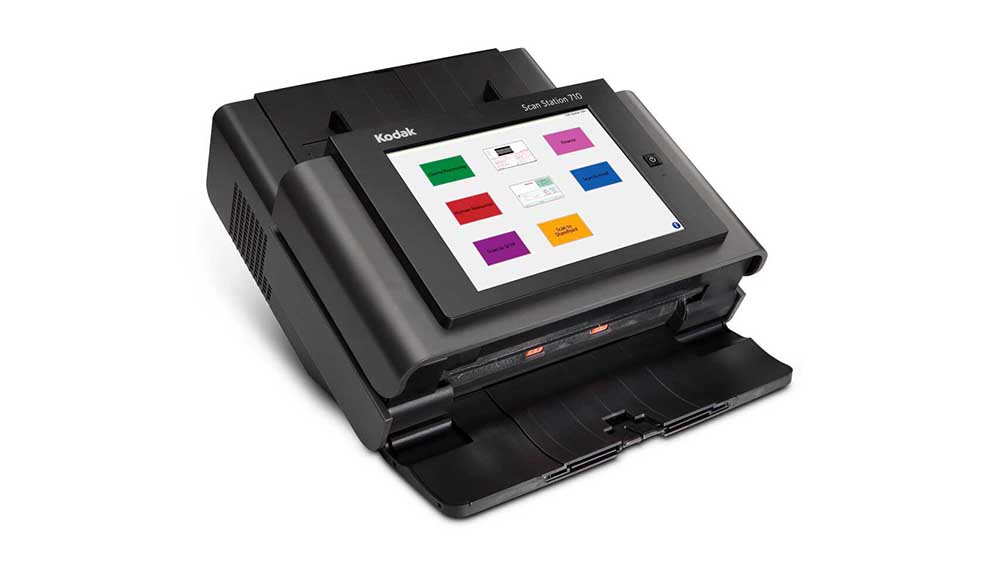Kodak Scan Station 710 review
Kodak’s standalone scan factory is perfect for businesses with serious archiving demands


The Scan Station 710 is ideal for businesses that don’t want to be tied to a host PC, or have to train employees in document-processing software. It’s simple to use, output quality is impeccable, and the tight security means you can strictly control usage.
-
+
Excellent security controls; Easy to use; Fantastic accuracy;
-
-
Microphone picks up lots of noise; Loose paper guides;

Need a scanner that can stand on its own two feet? One that doesn't require you to load client software onto everyone's PC? Then Kodak's Scan Station 710 could be the answer.
The 710 has everything it needsto scan documents, convert themto a wide range of formats and send them to multiple destinations. It runs Windows 8.1 Embedded, and has a large 24.6cm colour touchscreen from which users access all scanning tasks.
To configure the scanner, we loaded Kodak's remote administration utility on a Windows PC. This discovers the scanner on the network and provides the functions you need to get set up.
We provided a local password to secure administrative access, added an email server and joined the scanner to an Active Directory (AD) domain. We could then easily import users and groups from our AD server using LDAP.
The Scan Station 710 can scanto network shares without AD authentication, but you must provide one local username and password for all systems hosting shared folders.
Scan settings use profiles for TIFF, JPEG, DOC, XLS, RTF, PDF and searchable PDF formats, resolutions, colour or mono, plus duplexand other options such asdeskew and blank page detection.
Destinations can be set as network shares, email addresses, FTP, fax and SharePoint servers, printers or Kofax Front Office servers. Setting up jobs is a simple case of linking destinations with settings and groups. Finally, you can save your settings and upload them via the admin utility.
With all this set up, using the Scan Station 710 is as easy as loading a document and tapping the relevant job icon on the screen. This is nicely accessible for users, and it means you don't need to expose the full set of scan settings at the control panel, so you can decide precisely what users are allowed to do.
Another smart touch is the ability to attach a voice message to a job, using the built-in microphone and speaker an easy way to add a note to a scanned document. This worked fine with scans to email, where the WAV file was sent as an attachment.
The Scan Station 710 is a strong performer. After setting a network share as our destination, a duplex mono scan of 30 statements completed at 72ppm at both 200dpi and 300dpi.
Colour scans reduced this, but only to 60ppm; there was a further 30-second PDF-conversion process, but this ran in the background, so the next scan job could be started without delay.
Converting the statements to a searchable PDF took over five minutes, but scan quality and accuracy were the best we've seen from a desktop scanner. Focus was sharp for all our test documents, and the ADF handled our flimsy till receipts with no jams.
We did have a few minor quibbles with the Scan Station 710. The ADF's adjustable paper guides are fairly loose, so they can get pushed apart, causing documents to skew slightly. And the microphone picks up lotsof background noise, so you won't want to locate the scanner in a noisy area.
The Scan Station 710 is ideal for businesses that don't want to be tied to a host PC, or have to train employees in document-processing software. It's simple to use, output quality is impeccable, and the tight security means you can strictly control usage.
This review first appeared in PC Pro magazine issue 252
Verdict
The Scan Station 710 is ideal for businesses that don’t want to be tied to a host PC, or have to train employees in document-processing software. It’s simple to use, output quality is impeccable, and the tight security means you can strictly control usage.
600dpi colour optical resolution
70ppm at 200dpi mono/colour
Simplex/duplex
75-page ADF
24.6cm colour touchscreen
Gigabit Ethernet
2 x USB3
2 x USB2
Internal microphone/speaker
Daily duty cycle, 6,000 pages
External PSU
Windows 8.1 Embedded Industry Pro
1.99GHz Intel Celeron
4GB DDR3 RAM
500GB SATA hard disk
Kodak Remote Administration software
356 x 382 x 206mm (WDH)
1yr advanced replacement warranty
Get the ITPro daily newsletter
Sign up today and you will receive a free copy of our Future Focus 2025 report - the leading guidance on AI, cybersecurity and other IT challenges as per 700+ senior executives
Dave is an IT consultant and freelance journalist specialising in hands-on reviews of computer networking products covering all market sectors from small businesses to enterprises. Founder of Binary Testing Ltd – the UK’s premier independent network testing laboratory - Dave has over 45 years of experience in the IT industry.
Dave has produced many thousands of in-depth business networking product reviews from his lab which have been reproduced globally. Writing for ITPro and its sister title, PC Pro, he covers all areas of business IT infrastructure, including servers, storage, network security, data protection, cloud, infrastructure and services.
-
 Westcon-Comstor and Vectra AI launch brace of new channel initiatives
Westcon-Comstor and Vectra AI launch brace of new channel initiativesNews Westcon-Comstor and Vectra AI have announced the launch of two new channel growth initiatives focused on the managed security service provider (MSSP) space and AWS Marketplace.
By Daniel Todd Published
-
 Third time lucky? Microsoft finally begins roll-out of controversial Recall feature
Third time lucky? Microsoft finally begins roll-out of controversial Recall featureNews The Windows Recall feature has been plagued by setbacks and backlash from security professionals
By Emma Woollacott Published
-
 The UK government wants quantum technology out of the lab and in the hands of enterprises
The UK government wants quantum technology out of the lab and in the hands of enterprisesNews The UK government has unveiled plans to invest £121 million in quantum computing projects in an effort to drive real-world applications and adoption rates.
By Emma Woollacott Published